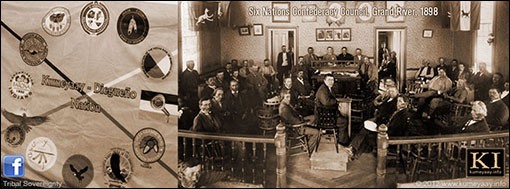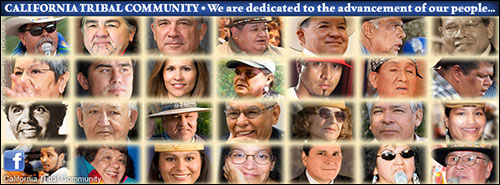| Pine Ridge Indian Reservation, Little Wound High School, South Dakota, December 11, 2004, tribal riders rode in on horseback from four directions.
INAUGURATION PHOTOGRAPHS:

Photos/layouts by Gary Ballard for TASPAN.ORG, courtesy of Hank & Shirley Murphy family archive. View the complete 36th Presidential Inauguration historical photos archive online.
INAUGURAL POWWOW PICTURES:

John Glover said an American Indian story describes how the woman walked behind the man "because she needed to tell him which way to go." An outsider might assume the man was leading and the woman was subservient, he said.
Firethunder said she hasn't spent much time reflecting on the gender aspect of her election. "I suppose that as a woman I have to work harder to break down preconceptions people have about women in leadership," she said. "But that isn't a priority for me. I know who I am. I'm aware of what power is, but I know it's about public service, not about me. I have been preparing for this all my life,” Firethunder told the Native American Times. “Still, I don’t feel any different than I did before the election. Maybe be more responsible, maybe.”
Firethunder was born in Kyle, South Dakota, on the Medicine Root Creek tiospaye tribal land on the Pine Ridge reservation. She grew up in a Lakota-speaking home and was introduced to English as a second language at age 5. She attended Red Cloud School near Pine Ridge through the 10th grade, then her family moved to Los Angeles in 1963.
Her father, Steve Apple, a rancher suffering through hard times and wanting more for his family, used the federal government's relocation program to move to California, where he found work in a food processing factory. "It was a union job, so the pay was quite good," Firethunder said. "Back home, there were even fewer jobs then than there are now."

Native American Indians on horseback approached Little Wound High School in Kyle, South Dakota, from four directions — north, south, east, west.
The Apple family lived in East Los Angeles, in a neighborhood Firethunder and her sisters recall as being packed with all sorts of races and cultures. She also began working at a hospital as a nurse's aide. She'd work a night shift, sleep on the bus to school, work her way through classes and homework, then report for the next shift at the hospital.
After high school, she married and had two children. The marriage, she says, didn't work out, and "there I was, a young, single mother on welfare with two kids. I had no skills, but I was very ambitious, and my social worker got me into a one-year nursing program."
When she finished the licensed practical nurse course work and passed the state board tests, "My whole life changed. I started earning a pretty good salary, and I began to get involved in some public service work. That started me on the path that led to this moment right here." Firethunder helped start the first free health clinic for Native Americans in Compton, Calif.
She said the experience helped her learn to use communications skills, work with people, write grants, recruit doctors and organize enterprises. She moved to San Diego in 1980 and resided there until her boys graduated from High school and collaborated with three other Native American nurses to start a health clinic there that is still delivering services to the San Diego Native American community. While she worked at that clinic, she lobbied the state government in Sacramento for help for health clinics for American Indians.
In 1989, she returned to the Pine Ridge reservation, a family decision she said she made simply because circumstances and opportunities were right, "It was time to come home. "Prior to being elected to office, Firethunder was involved in a South Dakota program to cut down on domestic violence. She has also adopted needy children, raising them as if they were her own.

It is customary for women to be caretakers of the family circle. They are the matriarchs, but their role traditionally is primarily with the family, and for this reason they generally rarely served in politics directly. However, the prophecies said that in the future the Oglala Lakota people will experience different and uncommon events. Pres. Firethunder's election is certainly one such event.
Her powerful work over many years on issues such as domestic violence prevention have helped prepare Ms. Firethunder to fulfill her role as a leader and a caretaker of the family of the Oglala Lakota Nation as a whole.
Cecilia Firethunder has dedicated much of her adult life to the defense of the Indian family and the struggle against abuse of Indian women and children. She is an advocate of the rescue and use of the Lakota language by the younger generation. Marjene Ambler, in Tribal College Journal, wrote, "Lakota language advocate Cecilia Firethunder uses healing ceremonies to free the tongues of people too ashamed to 'remember' their Native language.
In many cases, these feelings toward the language have led to hating their own skin color." Indian Country Today columnist Suzan Shown Harjo wrote on our Web site edition about Firethunder's work "to educate Lakota people about Lakota traditions of gender balance and the sacredness of children and elders." Harjo pointed out that Firethunder's Lakota name means "Good Hearted Woman."
A practical nurse, Firethunder established an organization, Sacred Circle, to address domestic violence. Her career stands as testimony of the effort to help rebuild the self-esteem of women in her community and nationally. She is just the kind of courageous and outgoing woman leader that a people wanting to re-strengthen their nation from the ground up, family by family and tiospaye by tiospaye, could appeal to for understanding and assistance.
The election of a woman to the nation's highest office is a first for the Oglala people and we hope it signals a new volition to confront the issue of respect and rebuilding of families for that embattled community. Pine Ridge is not alone as a community, not by a long shot, to be in the quagmire and tragedy of family violence. However, it could be the place where the body politic begins to heal itself, from the women outward.
 We congratulate Cecilia in her victory and wish the outstanding woman leader all the perseverance and support she deserves. If the Oglala families — including the strong family men — get behind their new leader and work with her to build coalitions for political power and development, much could be accomplished. Not only from the federal government but also from foundations and private donors, Cecilia is well suited, as a woman leader heading up a new administration, to bring home important benefits in response to the aspirations of the Oglala communities. We congratulate Cecilia in her victory and wish the outstanding woman leader all the perseverance and support she deserves. If the Oglala families — including the strong family men — get behind their new leader and work with her to build coalitions for political power and development, much could be accomplished. Not only from the federal government but also from foundations and private donors, Cecilia is well suited, as a woman leader heading up a new administration, to bring home important benefits in response to the aspirations of the Oglala communities.
Most importantly, Cecilia Firethunder will be an inspiration to young women to reach for leadership and pursue the path of self-esteem and self-dignity.

From consideration as sacred and as centrally important to the nations, Indian women have too often been denigrated and abused. This is the conclusion of the "Family Violence and American Indians/Alaska Natives: A Report to the Indian Health Service Office of Women's Health," a compendium produced in October 2002, by Dr. Laura Williams, et. al.
Sexual assault against Indian women is more than double that among blacks and three times that of whites. Forty-six percent of violence and 70 percent of crime is alcohol related. Acquaintances (38 percent) and strangers (46 percent) have the highest rates as perpetrators against Indian women. Family and intimates account for around 10 percent. In domestic violence, poverty and alcohol are the major factors.
She is also a significant role model for young girls and women, not just in her own nation, but also for indigenous women throughout Indian country. In South Dakota, Firethunder joins Madonna Archambeau, tribal chair of the Yankton Sioux Tribe. The lists of former presidents of the Flandreau and Crow Creek tribes in South Dakota in recent years also have included women. And in the Nov. 2 election, Theresa Two Bulls of Pine Ridge became the first Lakota woman ever elected to the South Dakota Legislature. She won a seat in the state Senate, defeating incumbent Republican Michael LaPointe of Mission.
Women are ascending to tribal leadership roles around the country. When Herminia Frias became the first woman elected to lead the Pascua Yaqui Tribe of Arizona this year, the Arizona Daily Star noted that her victory meant that nine of that state's 22 federally recognized tribes had female leaders.
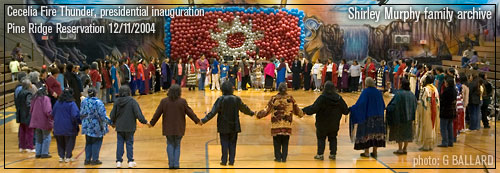
Wilma Mankiller attended Cecelia Firethunder's historic Presidential Inauguration on the Pine Ridge Reservation, December 11, 2004 and is pictured above forming a circle of American Indian women in support of Firethunder.
In 1985, Wilma Mankiller became the first woman elected chief of the Cherokee Nation in Oklahoma. Kathryn Harrison was the first female to lead the Confederated Tribes of the Grand Ronde in Oregon. “Women have always had a decision-making role in tribal governments, but the elected positions they are seeking and winning in recent years are more visible signs of that involvement.” John Glover said, “women often are more economically stable than men on reservations. "Take a look at who's going to the tribal colleges and going on for degrees," he said. "Indian women are doing that to a much larger degree than Indian men." Some of that is by necessity, he said. Reservations have a sizable number of single mothers, as do most lower-income segments of society, Glover said. "Women have responded to that by becoming more stable economically, taking advantage of education and programs available to them and, either by choice or as a matter of circumstances, they've been forced to become a stronger component of the reservation community," he said.
Traditionally, women in many tribes were the caregivers, keepers of family values and organizers and administrators of the domestic situations. Those skills travel well into roles as nurses and administrators in health care clinics, administrators in schools or on school boards and other important tribal government positions.

Tribal members participate in the event outside Little Wound High School on the reservation.
Many commended Cecilia for focusing immediately on the economic and financial transparency situation at the tribe. She noted it was her first mandate and has been the sore point about the Oglala Sioux Tribe for her whole base of supporters. The Pine Ridge reservation suffers from extreme unemployment — a severe lack of any work opportunity for most of the tribal youth and membership. Yet, specific business and tiospaye-building initiatives are growing in capacity and are important pieces of the nation-rebuilding puzzle.
These are essential building blocks of any new campaign to tackle the serious problems of Indian country. We urge the foundation world and the NGO community to pay attention to Pine Ridge, its issues and problems; to support the work of both government but also of independent organizations as they confront the problems of their people. More importantly, we urge Indian country itself to identify ways it can create or stimulate employment opportunities for the Oglala Sioux Tribe and South Dakota's other tribal communities. It is time to end the despair and restore opportunity.
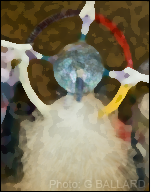 Much of Firethunder's conversation is focused on heart, and spirit, and personal relationships. Build the relationships with a good heart, she says, and only good things can result. Much of Firethunder's conversation is focused on heart, and spirit, and personal relationships. Build the relationships with a good heart, she says, and only good things can result.
As to commentary on the emergence of women in tribal leadership roles she favors, "Sovereign women strengthen sovereign nations." From a Cheyenne saying: "A nation is not defeated until the hearts of its women are on the ground. Then it is done, no matter how brave its warriors or how strong its weapons."
BACK TO ROY COOK'S ARTICLES PAGE... |
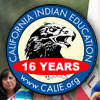
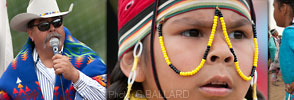

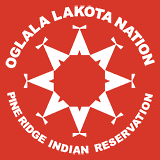
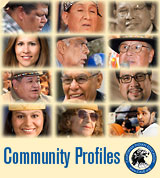
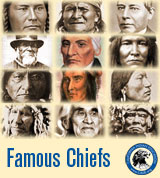
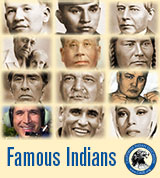








 We congratulate Cecilia in her victory and wish the outstanding woman leader all the perseverance and support she deserves. If the Oglala families — including the strong family men — get behind their new leader and work with her to build coalitions for political power and development, much could be accomplished. Not only from the federal government but also from foundations and private donors, Cecilia is well suited, as a woman leader heading up a new administration, to bring home important benefits in response to the aspirations of the Oglala communities.
We congratulate Cecilia in her victory and wish the outstanding woman leader all the perseverance and support she deserves. If the Oglala families — including the strong family men — get behind their new leader and work with her to build coalitions for political power and development, much could be accomplished. Not only from the federal government but also from foundations and private donors, Cecilia is well suited, as a woman leader heading up a new administration, to bring home important benefits in response to the aspirations of the Oglala communities.


 Much of Firethunder's conversation is focused on heart, and spirit, and personal relationships. Build the relationships with a good heart, she says, and only good things can result.
Much of Firethunder's conversation is focused on heart, and spirit, and personal relationships. Build the relationships with a good heart, she says, and only good things can result.